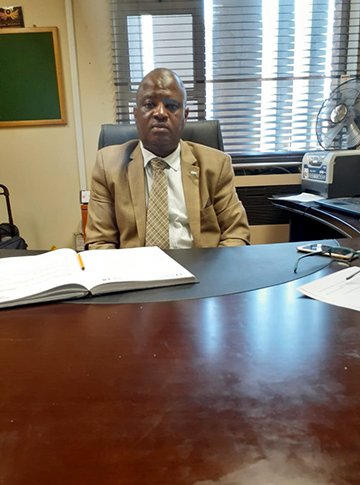News & Events
Top cop lauds Unisa’s RPL programme
Lieutenant Colonel Jerry Maphanga from the South African Police Service’s (SAPS’s) Directorate for Priority Crime Investigation (better known as the Hawks) completed two degrees through Unisa’s recognition of prior learning (RPL) programme.

Lieutenant Colonel Jerry Maphanga (Unit Commander: SAPS's)
Due to hardships and being raised by a single parent, Maphanga had to leave school in standard nine to look for employment so he could support his family financially. In 1986, the SAPS Logistics Department appointed him as a cleaner. He has come a long way, and currently he is a unit commander at the Hawks.
Commenting on Unisa’s RPL programme which gives mature students access to university qualifications, Maphanga says he appreciates the support given to him to complete BTech degrees in Policing and Forensic Investigation. ‘If it was not for the RPL programme, I would not have been where I am today’ says Maphanga. ‘The university played a huge role in giving me access to higher education to succeed in my workplace, and staff members such as Ms Muhle Lewis assisted tirelessly with both my achievements, he said.
myUnisa interviewed Maphanga about his RPL experience.
How do you apply the academic knowledge acquired through Unisa’s RPL programme in your daily work activities?
The academic knowledge is applied through the guidance I transfer to my subordinates by teaching them how to approach investigations and the steps that should be taken on the cases referred to our unit.
Did the Hawks support your studies?
Yes, indeed they supported my academic journey with Unisa throughout. I must make special mention of my supervisors who inspired me to study: Brigadier Solly Magobosha and Major General Sihle Nkosi. We can integrate what we learnt at the university with our jobs and that helps us to perform better and be productive.
How did you benefit from the RPL programme?
The RPL programme recognised both my internal and external courses, where the requirements to study both the degrees I acquired were that a person must be in possession of a diploma, but I was granted direct access to study with only the knowledge, skills and competencies I had acquired through the years.
About Unisa’s RPL programme
The RPL programme aims at valuing undervalued forms of knowledge to increase participation and access to higher education, especially among the previously disadvantaged sections of society.
It focuses on assessment that may limit the extent to which it is used, given that many people may not be aware of what they know, and the extent to which they know, or they may not even have the language capabilities to fully describe their knowledge.
‘I am proud because it shows that there’s a need for RPL in our community,’ says Muhle Lewis, an RPL Academic Coordinator in the College of Law. ‘It shows that students who are admitted through RPL are as capable as those admitted traditionally’. Lewis adds that Maphanga is a dedicated and committed student who took his studies seriously, which has paid up at the end.
‘Students need to apply through our applications office at applications@unisa.ac.za,’ says Muhle. After being accepted by the university, they register and identify all the modules complemented by experience that will meet learning outcomes. They then apply for credit modules through RPL.’
* By Lesego Ravhudzulo, Journalist, Department of Institutional Advancement
Publish date: 2019-10-18 00:00:00.0
